October 1, 2011
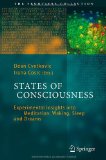
States of Consciousness: Experimental Insights into Meditation, Waking, Sleep and Dreams (The Frontiers Collection), ed. by Dean Cvetkovic, Irena Cosic (Springer, 2011)
(amazon.co.uk)
Book description from the publisher:
In this accessible overview of current knowledge, an expert team of editors and authors describe experimental approaches to consciousness. These approaches are shedding light on some of the hitherto unknown aspects of the distinct states of human consciousness, including the waking state, different states of sleep and dreaming, meditation and more. The book presents the latest research studies by the contributing authors, whose specialities span neuroscience, neurology, biomedical engineering, clinical psychology and psychophysiology, psychosocial medicine and anthropology. Overall this anthology provides the reader with a clear picture of how different states of consciousness can be defined, experimentally measured and analysed. A future byproduct of this knowledge may be anticipated in the development of systematic corrective treatments for many disorders and pathological problems of consciousness.
Google Books preview:
Comments (0)
- consciousness,meditation,new books
August 8, 2011
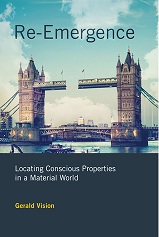
Re-Emergence: Locating Conscious Properties in a Material World by Gerald Vision (MIT Press, 2011)
(amazon.co.uk – 30 Sep)
Product description from the publisher:
The presence of sentience in a basically material reality is among the mysteries of existence. Many philosophers of mind argue that conscious states and properties are nothing beyond the matter that brings them about. Finding these arguments less than satisfactory, Gerald Vision offers a nonphysicalist theory of mind. Revisiting and defending a key doctrine of the once widely accepted school of philosophy known as emergentism, Vision proposes that conscious states are emergents, although they depend for their existence on their material bases. Although many previous emergentist theories have been decisively undermined, Vision argues that emergent options are still viable on some issues. In Re-Emergence he explores the question of conscious properties arising from brute, unthinking matter, making the case that there is no equally plausible non-emergent alternative. Vision defends emergentism even while conceding that conscious properties and states are realized by or strongly supervene on the physical. He argues, however, that conscious properties cannot be reduced to, identified with, or given the right kind of materialist explanation in terms of the physical reality on which they depend. Rather than use emergentism simply to assail the current physicalist orthodoxy, Vision views emergentism as a contribution to understanding conscious aspects. After describing and defending his version of emergentism, Vision reviews several varieties of physicalism and near-physicalism, finding that his emergent theory does a better job of coming to grips with these phenomena.
See also: Works by Gerald Vision at PhilPapers
Comments (0)
- consciousness,new books,philosophy of mind
August 6, 2011
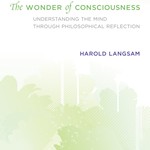
The Wonder of Consciousness: Understanding the Mind through Philosophical Reflection by Harold Langsam (MIT Press, 2011)
(amazon.co.uk – 30 Sep)
Product description from the publisher:
Consciousness is a wonderful thing. But if we are fully to appreciate the wonder of consciousness, we need to articulate what it is about consciousness that makes it such an interesting and important phenomenon to us. In this book, Harold Langsam argues that consciousness is intelligible–that there are substantive facts about consciousness that can be known a priori–and that it is the intelligibility of consciousness that is the source of its wonder. Langsam first examines the way certain features of some of our conscious states intelligibly relate us to features of the world of which we are conscious. Consciousness is radically different from everything else in the world, and yet it brings us into intimate connection with the things of the world. Langsam then examines the causal powers of some of our conscious states. Some of these causal powers are determined in an intelligible way by the categorical natures of their conscious states: if you know what consciousness is, then you can also know (by the mere exercise of your intelligence) some of what consciousness does. Langsam’s intent is to get the philosophy of mind away from the endless and distracting debates about whether consciousness is physical or not. He shows that there are substantive things that we can discover about consciousness merely through philosophical reflection. The philosopher who takes this approach is not ignoring the empirical facts; he is reflecting on these facts to discover further, nonempirical facts.
Comments (0)
- consciousness,new books,philosophy of mind
July 1, 2011
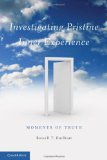
Investigating Pristine Inner Experience: Moments of Truth by Russell T. Hurlburt (Cambridge University Press, 2011)
(amazon.co.uk – 31 July)
Product description from the publisher:
You live your entire waking life immersed in your inner experiences (thoughts, feelings, sensations, etc.) – private phenomena created by you, just for you, your own way. Despite their intimacy and ubiquity, you probably don’t know the characteristics of your own inner phenomena; neither does psychology or consciousness science. Investigating Pristine Inner Experience explores how to apprehend inner experience in high fidelity. This book will transform your view of your own inner experience, awaken you to experiential differences between people, and thereby reframe your thinking about psychology and consciousness science, which banned the study of inner experience for most of a century and yet continued to recognize its fundamental importance. The author, a pioneer in using beepers to explore inner experience, draws on his 35 years of studies to provide fascinating and provocative views of everyday inner experience and experience in bulimia, adolescence, the elderly, schizophrenia, Tourette’s syndrome, virtuosity, and so on.
See also: Author’s website
Hurlburt’s previous book with Eric Schwitzgebel: Describing Inner Experience?: Proponent Meets Skeptic (Life and Mind: Philosophical Issues in Biology and Psychology) (MIT Press, 2007)
Comments (0)
- consciousness,new books
June 1, 2011
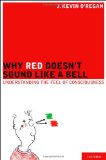
Why Red Doesn’t Sound Like a Bell: Understanding the Feel of Consciousness by J. Kevin O’Regan (Oxford University Press USA, 2011)
(amazon.co.uk)
Product description from the publisher:
This book proposes a novel view to explain how we as humans — contrary to current robots — can have the impression of consciously feeling things: for example the red of a sunset, the smell of a rose, the sound of a symphony, or a pain.
The book starts off by looking at visual perception. Our ability to see turns out to be much more mysterious than one might think. The eye contains many defects which should seriously interfere with vision. Yet we have the impression of seeing the world in glorious panavision and technicolor. Explaining how this can be the case leads to a new idea about what seeing really is. Seeing is not passively receiving information in the brain, but rather a way of interacting with the world. The role of the brain is not to create visual sensation, but to enable the necessary interactions with the world.
This new approach to seeing is extended in the second part of the book to encompass the other senses: hearing, touch, taste and smell. Taking sensory experiences to be modes of interacting with the world explains why these experiences are different in the way they are. It also explains why thoughts or automatic functions in the body, and indeed the vast majority brain functions, are not accompanied by any real feeling.
The “sensorimotor” approach is not simply a philosophical argument: It leads to scientifically verifiable predictions and new research directions. Among these are the phenomena of change blindness, sensory substitution, “looked but failed to see”, as well as results on color naming and color perception and the localisation of touch on the body.
The approach is relevant to the question of what animals and babies can feel, and to understanding what will be necessary for robots to become conscious.
See also: Author’s website, PhilPapers
Comments (0)
- consciousness,new books







